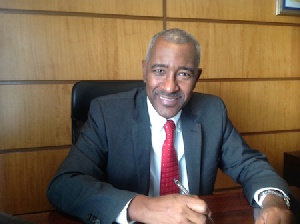- Home - News
- TWI News | TV
- Polls
- Year In Review
- News Archive
- Crime & Punishment
- Politics
- Regional
- Editorial
- Health
- Ghanaians Abroad
- Tabloid
- Africa
- Religion
- Election 2020
- Coronavirus
- News Videos | TV
- Photo Archives
- News Headlines
- Press Release
Business News of Tuesday, 21 June 2016
Source: newsday.co.tt
HFC boss markets Ghana in Trinidad and Tobago
From the much-talked about transfer of energy skills to manufacturing, agriculture, tourism and culture, Ghana presents a multitude of investment opportunities for Trinidad and Tobago (TT).
One company which realised this early on was Republic Financial Holdings Limited (RFHL), which in May 2015 became the majority shareholder in HFC Bank (Ghana) with 57.11 per cent equity stake. This followed the Mandatory Tender Offer (MTO) to shareholders with the approval of the Securities and Exchange Commission (SEC) and the Bank of Ghana.
During Prime Minister Dr Keith Rowley’s four-day official visit to Ghana last month, he spoke about TT’s 100-plus years of experience in oil and gas production and success in giving value to its natural gas resources.
“Our experience with utilising gas both for power generation and for the development of the petrochemical industry, as well as exports of Liquefied Natural Gas (LNG) could be of interest to countries in Africa and we are keen to share our experience in oil and gas with our brothers in Africa,” Dr Rowley said.
Seeking an insight into the aforementioned opportunities in the West African nation, Business Day interviewed Robert Le Hunte, managing director (MD) of HFC Bank (Ghana).
We began by examining the energy sector. Referring to Dr Rowley’s statements about knowledge and skills transfer, Le Hunte said business people in Ghana “need to learn how to negotiate and we were happy that the PM drove that point home.” “TT has developed a lot of skills in the gas industry. Take the Phoenix Park gas pipeline for example. We have that skill locally. The Ghanaian government can leverage to provide that type of service, especially in its gas industry.” Another area of opportunity is partnerships with TT companies “to provide services in the oil and gas sectors” of Ghana.
Le Hunte noted that over the years, Republic Bank Limited (RBL) has worked with a number of small contractors to help them develop their service expertise to meet international standards.
“These contractors who bank with us, they understand the industry and the need to develop those skills. We see ourselves doing that same thing here in Ghana, where we can partner with small contractors to provide them with funding so they will be able to develop the required skill, and bring it to a competency level. We also see the need for Trinidadian companies to partner with Ghanaian companies to help them through that learning curve.” Le Hunte added that HFC Bank (Ghana) has, over the past year, “brought business people from TT’s downstream” energy sector to Ghana.
He said businessmen such the former chairman of bpTT, Robert Riley, have spoken at seminars in Ghana because the bank views these as “an opportunity to leverage on the skills in Trinidad.” “We are aware of initiatives in the pipeline that both the State and private sectors are exploring in terms of joint venture opportunities both in Ghana and TT.
“Additionally, there are ongoing discussions with key businesses in the area of oil and gas, real estate and other areas which will be beneficial to both countries,” Le Hunte stated.
Turning to Ghana’s manufacturing sector, he described it as being “not very large”. This has led to the importation of “a lot of products” from Europe, Egypt and South Africa, among others.
“The Ghanaian market is made up of approximately 29 million people, so that’s why the importation of goods is necessary. Dominating the Caribbean market, we (TT) have our foot in South America, therefore Ghana is a great market to explore. Where the economics of Ghana are concerned, we are seeing a large number of persons in the middle class category as the country stabilises. There is great potential with Ghana being a very attractive market.” This is sure to be welcome news to local manufacturers as late last month, TT Manufacturers Association (TTMA) director, Christopher Alcazar, spoke about plants running below full capacity due to a drop in local demand.
Looking at the related field of agriculture and canned goods, Le Hunte said items such as jams, peas and carrots are just as popular in Ghana as they are here in TT.
He cautioned that Jamaica’s Grace Kennedy “is already in the market, and if they can get into Ghana and sell their products, there is also room for TT to ply their trade here.” Describing Ghana as “an attractive option for an export-driven manufacturing sector like TT” due to its dependency on imports, Le Hunte said the establishment of joint venture arrangements could result in products being manufactured locally in Ghana to reduce that country’s import bill.
On the export side of things, Le Hunte said Ghana produces pineapple and pawpaws. So while TT “natural juice producers are very interested” in selling their beverages there, juices made in Ghana are also likely to do well here at home.
“This is one of the messages which came across when PM Rowley visited in May - there are products that can find their way into TT and vice versa.” Regarding tourism, HFC Bank’s MD told Business Day even as Trinidad seeks to develop its tourism product in the same way as Tobago, “Trinidad must see itself as a transit link; as an alternative route to the United States of America (USA)” from West Africa.
Speaking of the possibility of a flight from Nigeria to the US via Ghana and TT, Le Hunte said this is “something that can be explored and I see it working to their advantage. Those markets in West Africa are English speaking, so it will help bring people close to the Caribbean.” Another reason he gave for promoting tourism was the fact that apart from the USA, “Nigeria has one of the largest populations”, with an estimated 186 million people.
“As a result there are a number of millionaires in Nigeria, therefore there is a need to develop tourism. In the whole West African market, we see both Nigeria and Ghana have great potential for tourism.” Culture, from Le Hunte’s point of view, is not limited to song and dance. Rather, he sees potential for a “merging” of the film industries in Nigeria, Ghana and TT.
“We can take the growing film industry and tap into some of the resources in West Africa. This will be a great way of merging cultures. Culture is not only dancing; it’s bigger than that. It can go a long way in exposing the market, which will allow people to tap into the wider African diaspora.” Noting that Ghana is talking about developing its own Carnival, Le Hunte said Ghana’s President, John Dramani Mahama, “mentioned that he wants to host a Carnival that can showcase the pride of West Africa.” Banking is another area with growth potential. There are “a lot of small banks” in the country, about 30 in total, of which HFC Bank accounts for three per cent of the market share.
Le Hunte said the bank, which is well known for its mortgage products and some investment products, recently introduced “the golden opportunity to apply for mortgages” at all 42 of its branches.
“We are making great strides in this area and in our thrust to have mortgages more accessible to the people of Ghana, we have penetrated the market more, offering customers the opportunity to obtain a mortgage quicker, simpler and more efficiently.”
HFC remains the leading mortgage provider in terms of volumes in the country. The bank has a more than 30 per cent share of the mortgage industry.
“In the past year, seven deposit products which cater for the individual’s lifestyle from the ‘cradle to golden ages’ were introduced to the Ghanaian market. The products have attractive interest rates and features. HFC Bank is the first to offer deposit products with such competitive rates (i.e. up to 15 per cent interest rates) in Ghana.”
Additionally, with the introduction of its new deposit products, Le Hunte said HFC Bank should see significant growth in its deposit market share.
“To achieve this, there is an aggressive integrated marketing campaign ongoing to push the products to our existing customers and potentials clients.”
Questioned about the ability of RBL and HFC Bank customers to use their respective Automated Teller Machine (ATM), Le Hunte told Business Day that while this is not currently possible, it is “something that we hope to address in the near future.” However, RBL customers with Visa cards can use HFC Bank ATMs in Ghana and vice versa.
All HFC Bank branches are networked, offering real time online banking services, so customers can therefore transact business at the nearest branch. The bank is represented in eight regional capitals in the country with 42 branches and 45 ATMs, Fastcash.
“Our strategic intent is to expand our electronic and mobile banking to pass on convenience in service delivery,” Le Hunte said.
In December 2012, RFHL purchased 8.79 per cent of HFC Bank and in April 2014, made a bid for majority stake in HFC. One year later, in April 2015, RFHL officially announced the opening of the period for the Mandatory Tender Offer. The offer was successful and the bank’s shareholding increased to 57.11 per cent majority in May 2015.
Le Hunte said his “vision for the Ghanaian market is integrally tied to my vision for the economic prospects of Ghana both in the short and the medium to long term.”
“The short term will be characterised by a degree of uncertainty dominated mainly by political activities. Although the general and parliamentary elections in November are expected to be free from violence, it is unclear whether the fiscal discipline that the government has exercised over the past two years in bringing down the deficit in line with IMF (International Monetary Fund) requirements will be maintained.”
Le Hunte said if this does not occur, it is likely to have a negative impact on the exchange rate, which has been fairly stable over the past six months. “This level of uncertainty had resulted in moderate to flat commercial activity in the market at present.”
Looking at the medium to long term, he said oil and gas production is expected to double with the coming on stream of earlier investments in these sectors. New investments are also expected to be made with the development of two new oil fields and a second gas processing plant.
“The efficiency of power supply is also expected to improve, based on the coming on stream of new power generating plants. These plants are expected to be fuelled by coal and natural gas, which should result in a reduction in cost of electricity to the end user,” Le Hunte stated.
“Republic Bank’s intention is to leverage our investment in HFC Bank and our knowledge of the market to help our customers take advantage of the potential that the Ghanaian market presents,” Le Hunte told Business Day.
HISTORY
HFC Bank (Ghana) Limited (formerly Home Finance Company) was licensed as a mortgage financing institution to implement the IDA/SSNIT Pilot Housing Finance Programme in Ghana. HFC was incorporated on May 7, 1990 under the Ghana Companies Code 1963 (Act 179) as a private limited liability company. The company commenced business on December 2, 1991 and was licensed by the Bank of Ghana as a non-bank financial institution on August 1, 1994.
On November 17, 2003, HFC Bank (Ghana) Limited was issued with a universal banking license by the Bank of Ghana, thus evolving into a fully-fledged universal bank. On May 13, 2015, the Securities and Exchange Commission signed off the results of a Mandatory Tender Offer (MTO), which formally made HFC Bank become a part of the Republic Bank family. Republic Bank is the leading bank in the Caribbean region, headquartered in Trinidad and Tobago with a 179-year old history. HFC Bank (Gh) is, therefore, a subsidiary of Republic Bank Limited of TT.
HFC Bank (Ghana) Limited, is a leading financial institution in Ghana. It offers one-stop financial services that include Corporate, Commercial and Retail Banking; Investment Banking; Mortgage Banking and Micro Finance. These services make HFC Bank arguably the most diversified universal banking institution in the Ghanaian banking industry.











